May 11, 2025 – 2nd day of farming volunteer work at Dubuk Retreat Center – weeding, harvesting balloon flowers, and mowing
Hello everyone. Today is the second day of our comprehensive maintenance work at the Dubuk Retreat Center farm. The clouds covered the sun, making it perfect weather for working outdoors.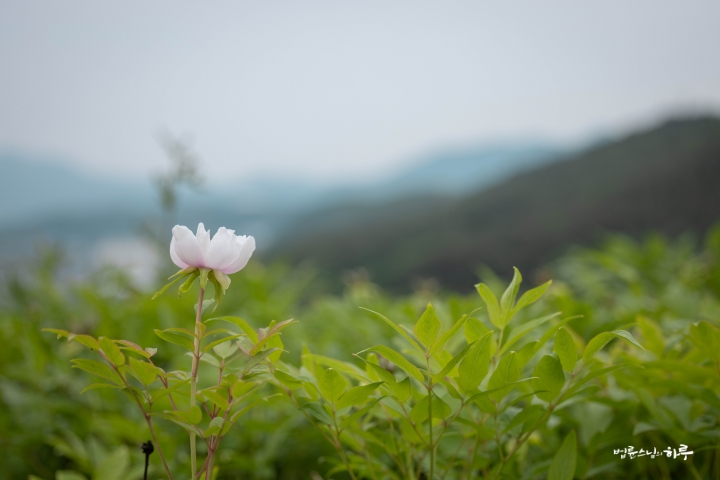
After completing his morning practice and meditation, Sunim went up to the upper field at 7 AM. Several Dharma teachers from the lay Sangha with extensive farming experience also joined to guide the volunteers with their tasks.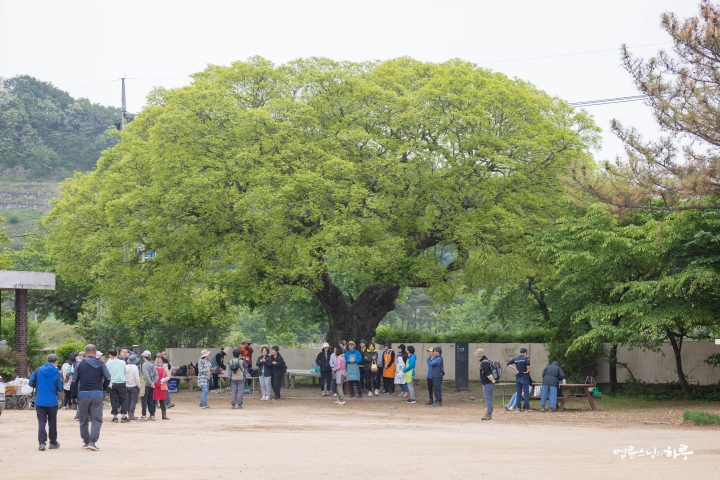
Before the volunteers arrived, Sunim surveyed the area to plan the day’s work and began by transplanting peonies. In the area where new fields were being prepared, some peonies and mugwort were growing. Sunim transplanted the peonies to one side and dug up all the mugwort, gathering it along the edges.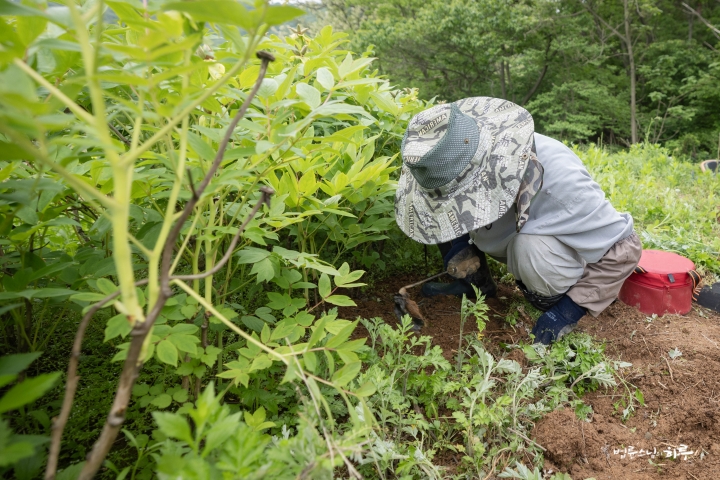
“When you dig up mugwort, don’t just leave it there because the roots will go back into the ground and grow again. Please dig it all up and gather it along the edges.”
Sunim carefully transplanted each peony one by one.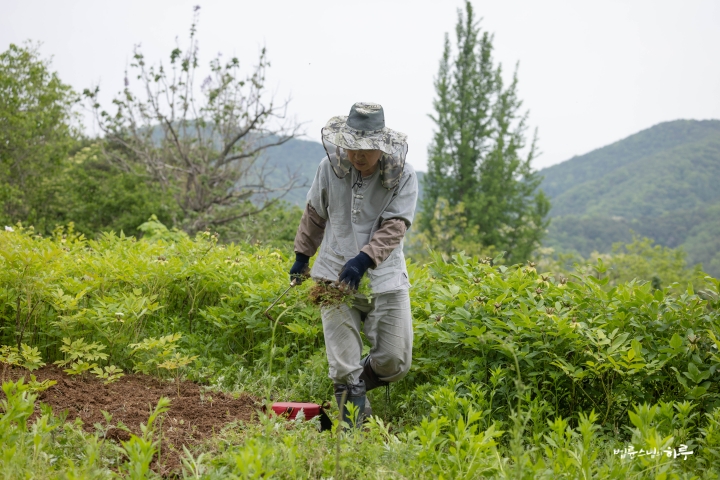
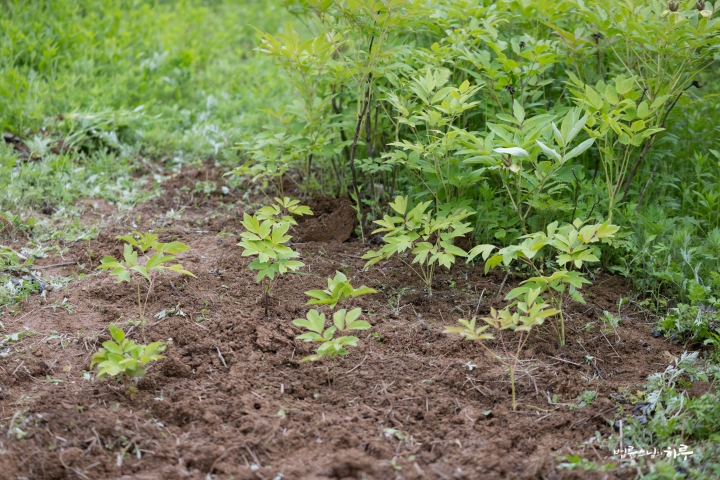
At 8:30 AM, about 60 volunteers from the Busan-Ulsan and Daegu-Gyeongbuk chapters arrived at the upper field.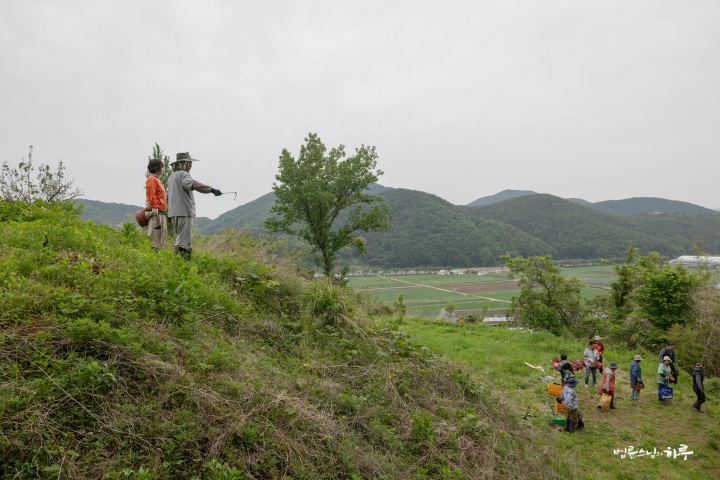
“Hello, Sunim.”
“Welcome. Please put on your seat cushions and grab a hoe each, then come up here.”
The upper field is divided into two sections – upper and lower terraces. After dividing the tasks, everyone dispersed into their assigned groups. Some volunteers put on seat cushions and headed to the upper terrace.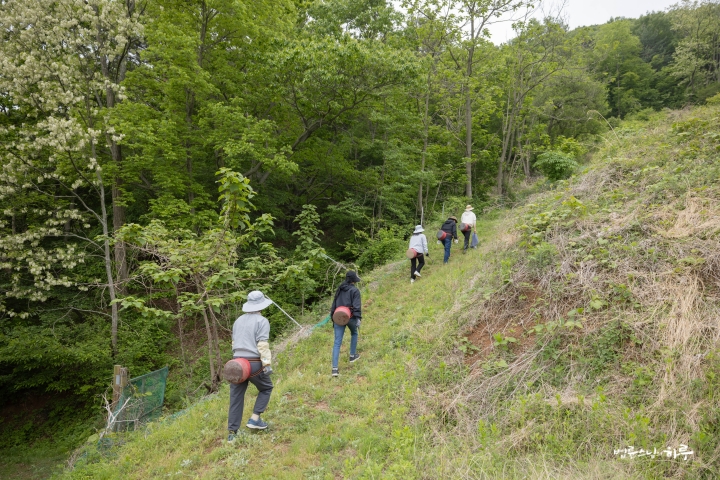
Dharma Teacher Seonju provided instructions for the tasks.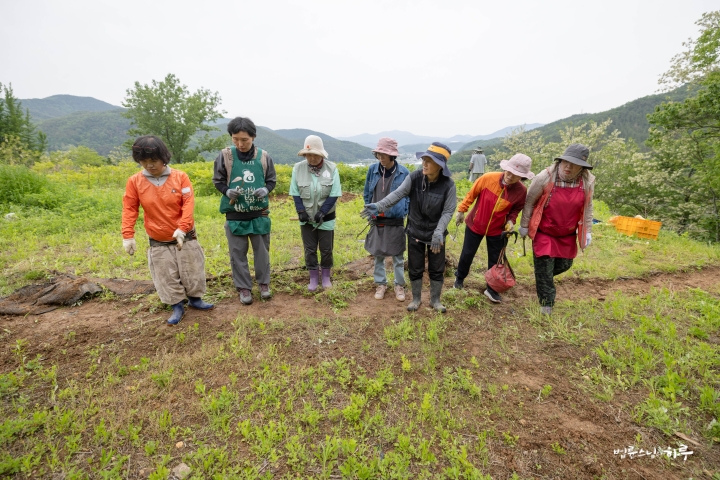
“This is the balloon flower field. Please sit in a row and start weeding from the end. Pull out all the weeds except for the balloon flowers.”
About 20 people sat in a row and began weeding. At first, it was difficult to distinguish between balloon flowers and weeds as the area was so overgrown, but with many hands working together, the field was quickly transformed, leaving only balloon flowers.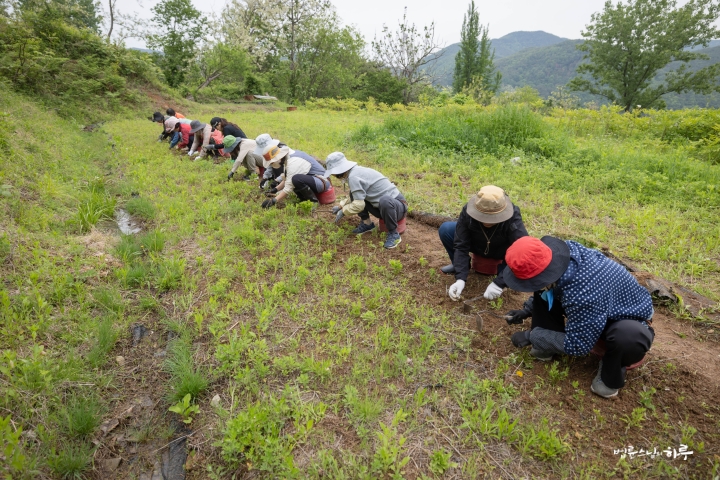
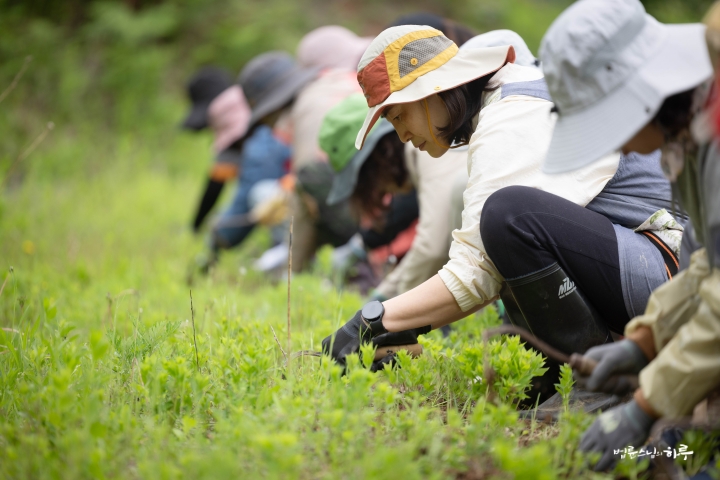
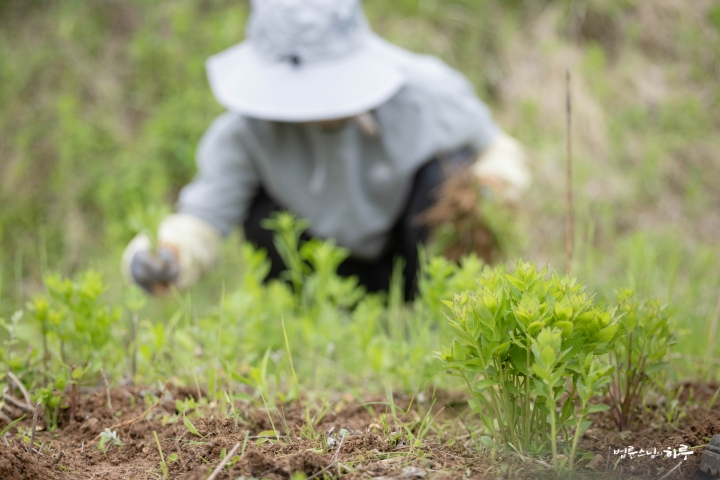
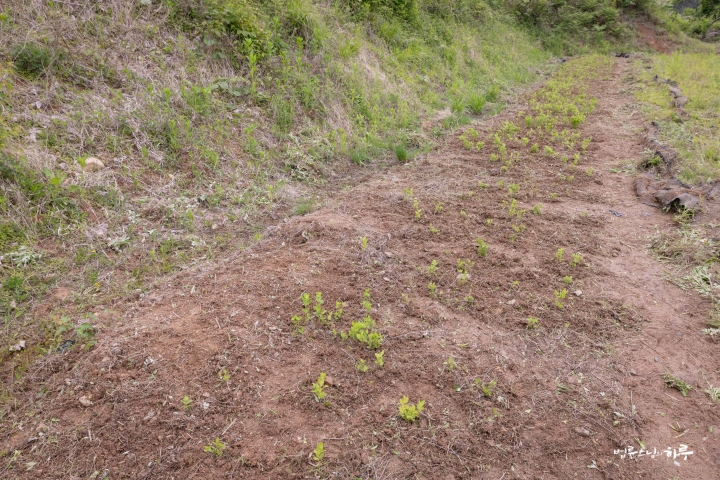
Sunim smiled and encouraged the volunteers.
“Did you pull out many balloon flowers by mistake? Good job.” (laughing)
Everyone laughed at Sunim’s joke and moved on to the next area. This time, they removed weeds from the peony bed. The peonies had grown quite large so the weeds couldn’t completely cover them, but there were many weeds on the ground. They scraped the soil with hoes to thoroughly clean the area, ensuring no small weeds remained.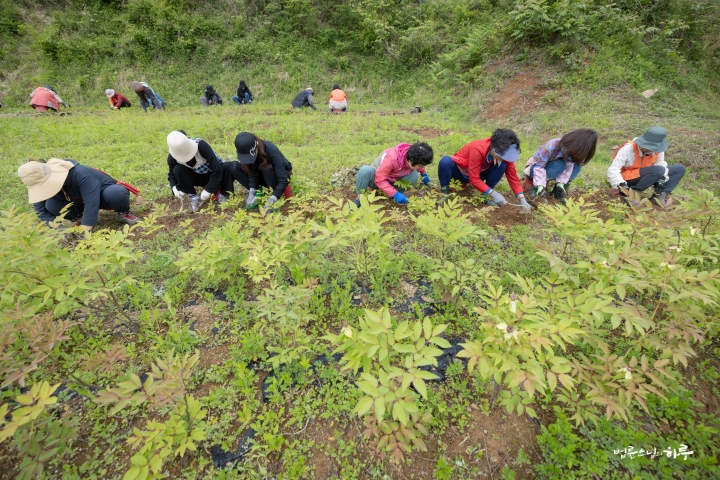
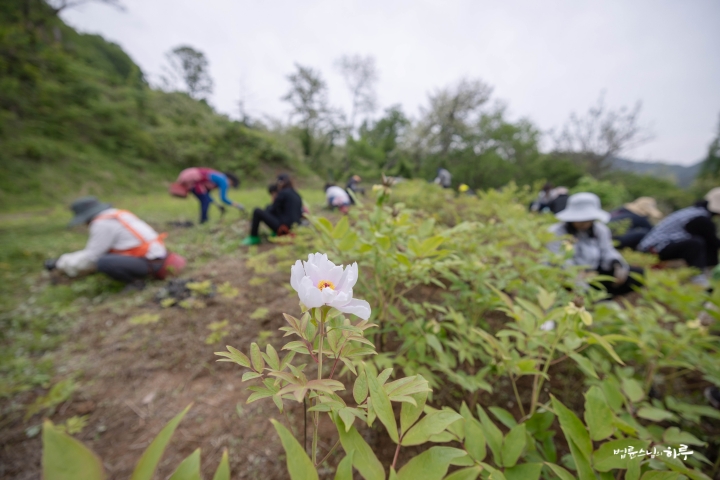
In a short time, the peony bed was transformed into a neat area with only peonies remaining. Most of the peonies had already bloomed and faded, leaving crown-like seed pods. Some pods had burst, scattering black seeds on the ground.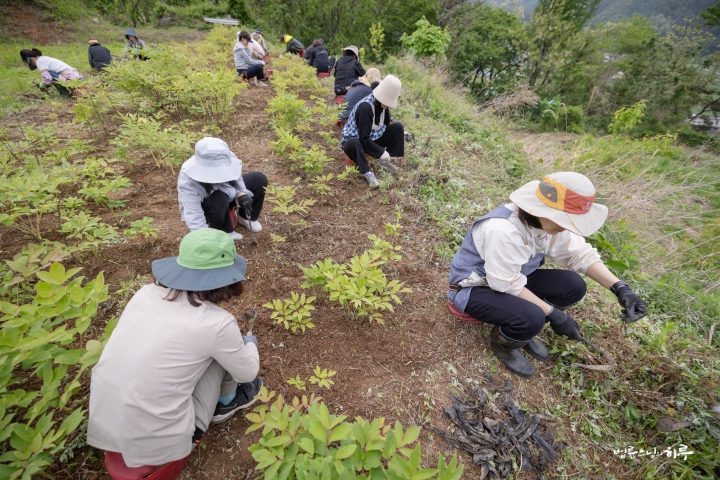
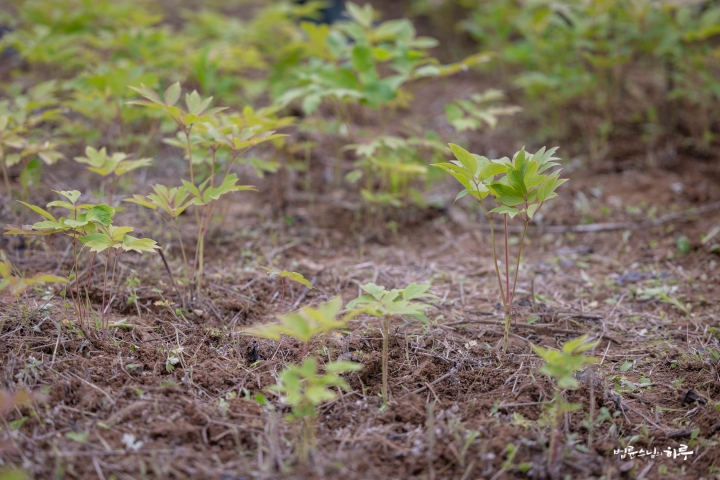
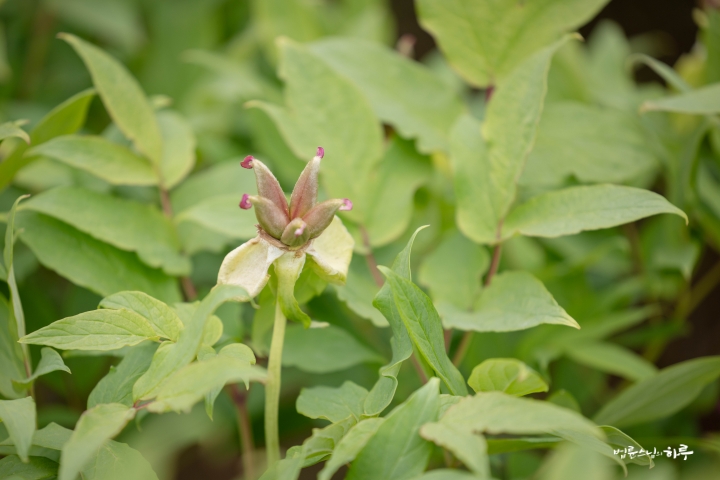
The volunteers hummed the song “Peony Camellia” as they pulled weeds.
The peonies have already faded, while the cuckoo sings in the distant mountains ♬ The sweet-faced peony girl smiles in my dreams. The world is windy and weary. As I wander from place to place, I will quietly, quietly fall asleep under some tree shade. Until the peonies bloom once more, please don’t forget me ♬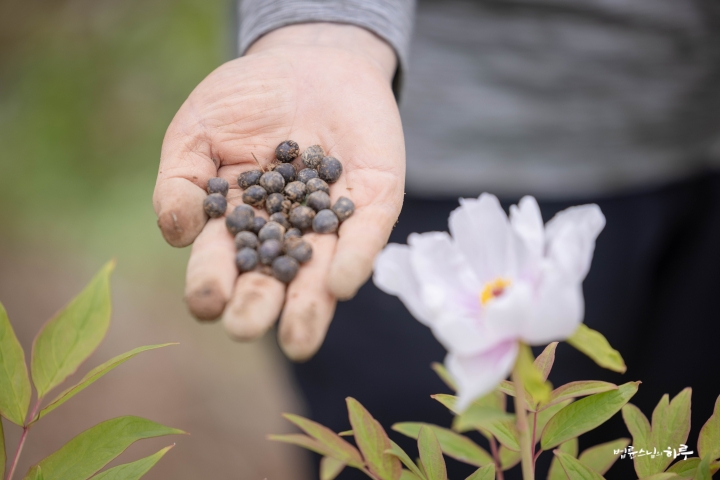
After watching the volunteers working diligently on the upper terrace, Sunim went down to the lower terrace. There, some male practitioners were operating string trimmers.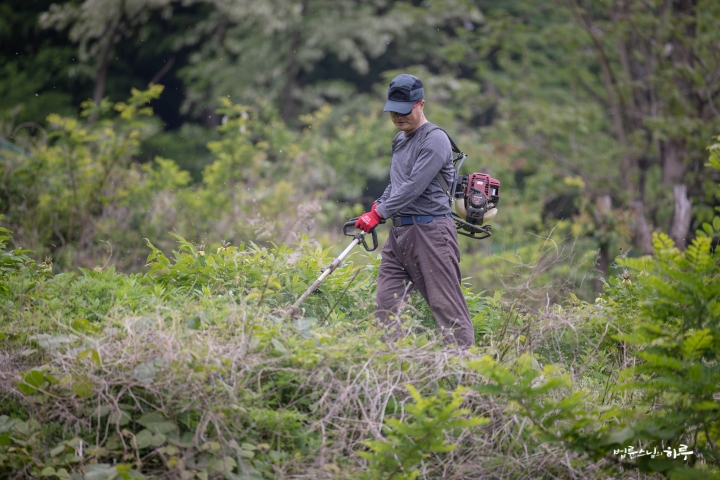
Sunim gathered all the practitioners and gave them instructions.
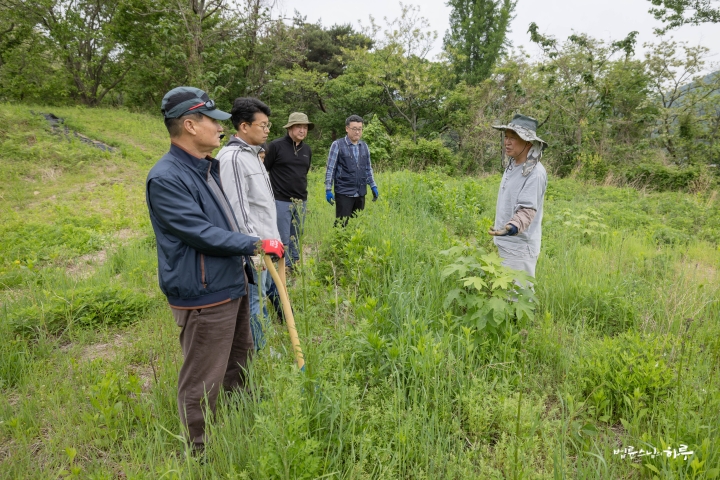
“We want to clear this field completely to plant sesame. Last year, the farming team planted several trees here because they found it difficult to manage this field. So before we clear the field, we need to transplant these trees. First, use the string trimmers to clear the weeds around the edges, then dig holes. We’ll transplant the trees there.”
Various trees such as thorny ash, aralia, and a plum tree were sparsely planted in the field. The men dug holes along the edges for transplanting, while Sunim pruned the trees to be moved and cleared the weeds around them.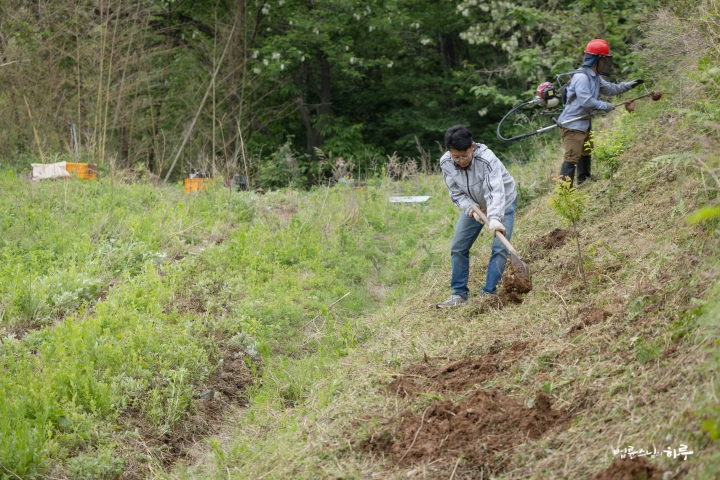
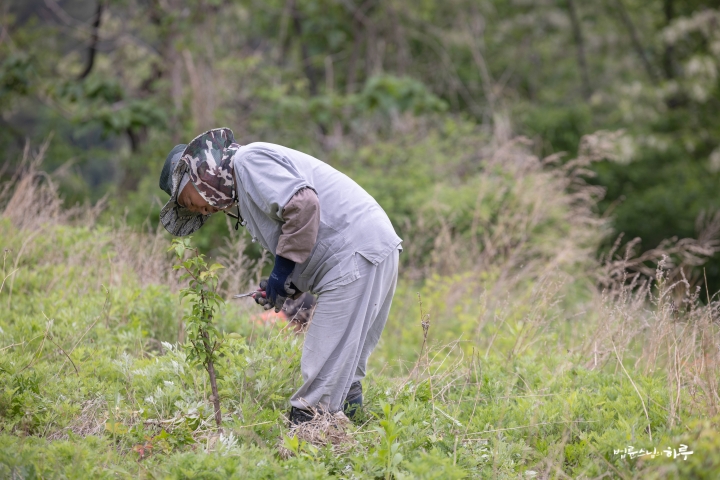
After Sunim pruned the trees, the practitioners uprooted them with shovels and carried them to the edges.
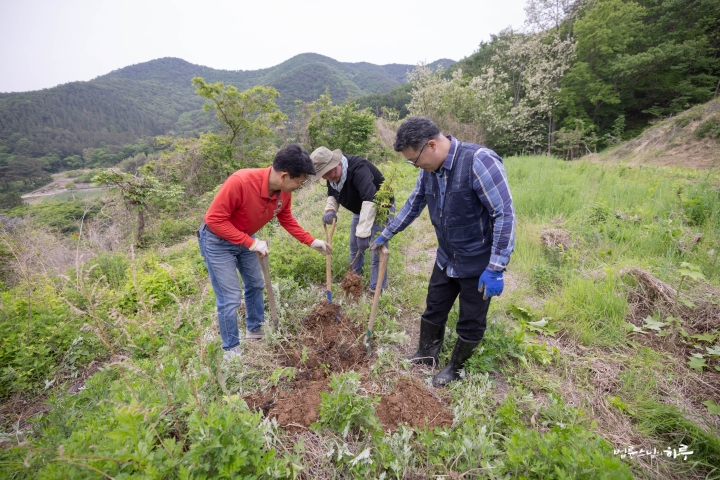
After transplanting all the trees, they were about to plow the field, but Sunim felt it would be a waste to lose the abundant balloon flowers growing throughout the area.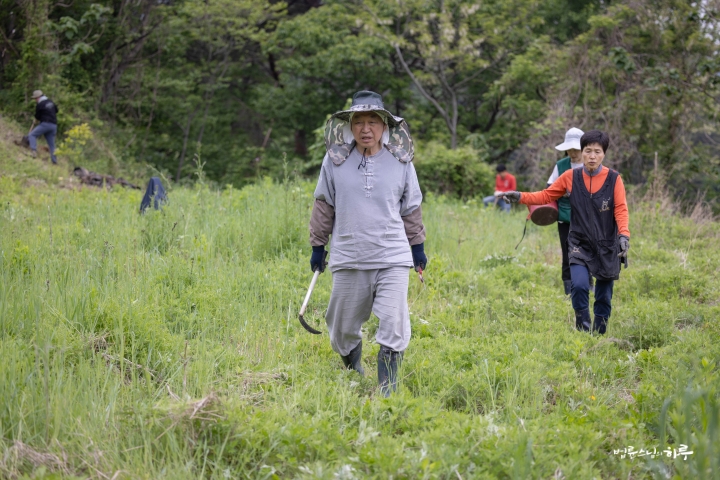
“Even in a weedy field, having this many balloon flowers planted makes it as valuable as a gold field. Let’s harvest as many as possible before plowing the land.”
The volunteers agreed with Sunim’s suggestion. Those who had been weeding on the upper terrace also came down to help harvest the balloon flowers.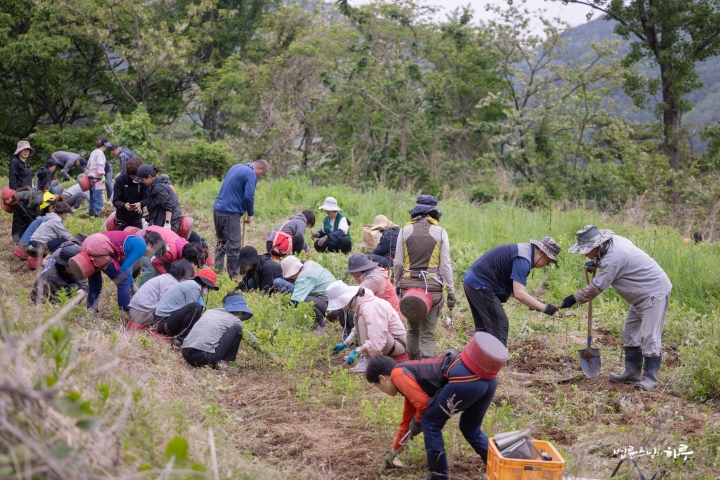
After digging up the balloon flowers with shovels and shaking off the soil, the thick roots were revealed.
“Wow, they’re so thick!” 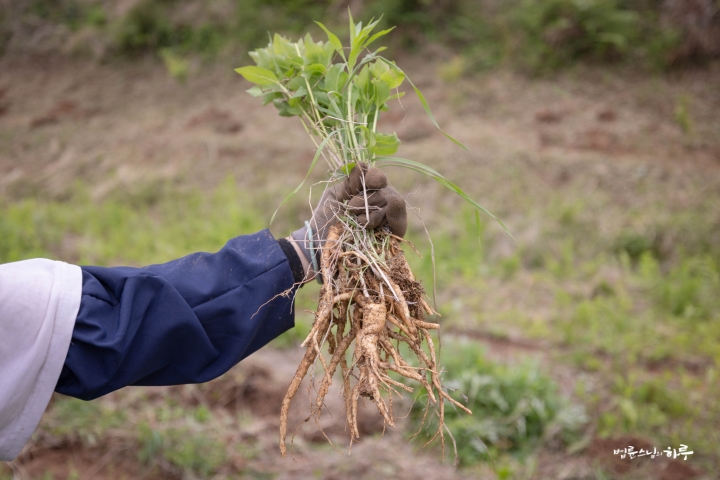
Everyone was as excited as if they had found wild ginseng. Sunim and the practitioners dug up the balloon flowers with shovels, and the volunteers gathered around to clean the roots. The field quickly transformed into a balloon flower production factory.
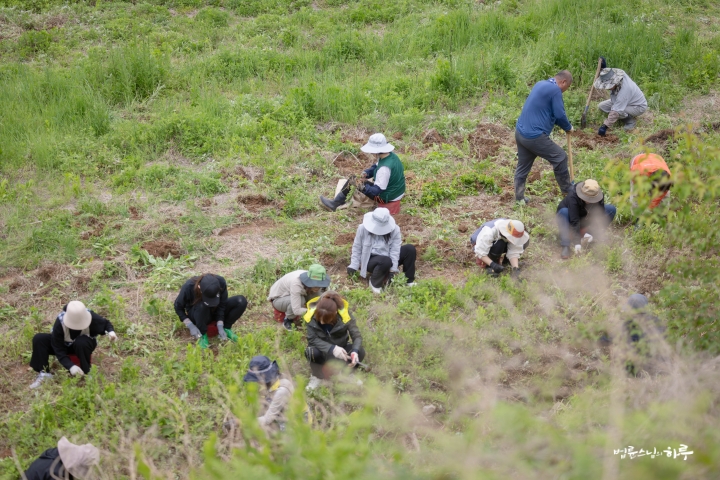
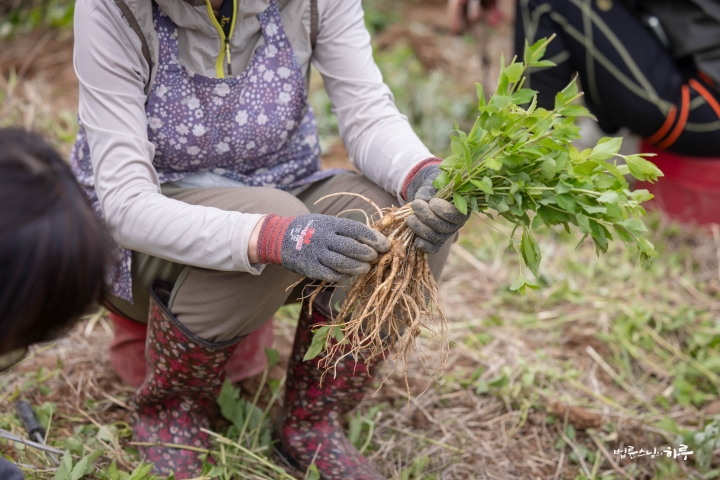
Thanks to the decision to harvest the balloon flowers, they collected more than five bags from the field.
“Sunim, it’s time for a snack break.”
Sunim was thoroughly enjoying harvesting the balloon flowers.
“Harvesting balloon flowers is so much fun. Please go ahead and eat first.”
After harvesting more balloon flowers for quite some time, Sunim finally left the field.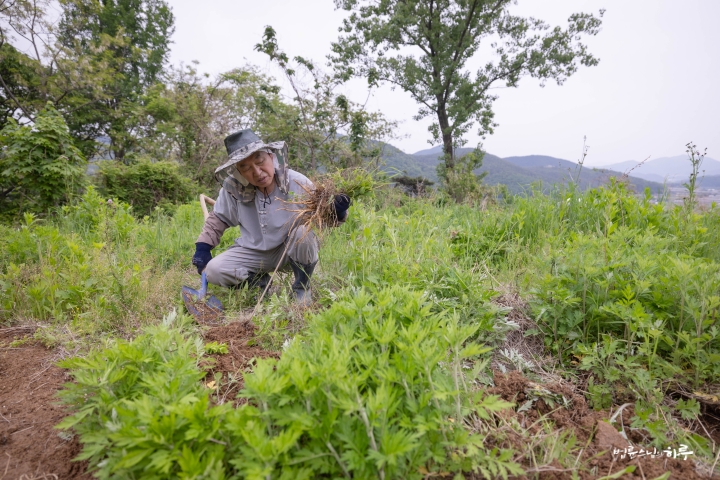
While cooling down and having a snack, Sunim explained why he had urgently recruited volunteers today.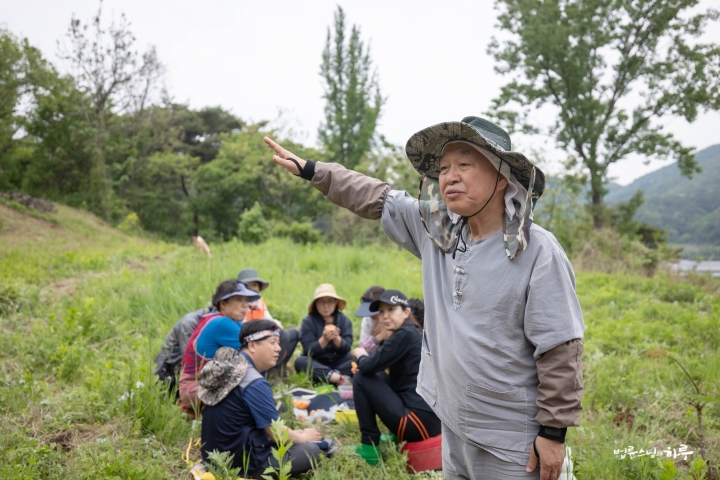
“We had been cultivating this field well, planting balloon flowers and peonies. But for the past two years, I’ve had many international commitments and couldn’t visit this field often. So I entrusted it to the lay Sangha Dharma teachers, but they were too busy with their own lives. As a result, in just two years, it turned into a field of weeds. Even the fences we carefully built were completely covered and disappeared under the weeds. In its current state, it’s impossible to weed everything, but it would be a waste to leave the field fallow. So we decided to plow it with a tractor.
But as you can see, there are many balloon flowers everywhere. So we plan to weed just one row to preserve as a balloon flower bed and plow the rest. In the meantime, please help harvest the larger balloon flowers. If you help maintain the field today, the Dharma teachers will take full responsibility for its care afterward. During the COVID-19 pandemic, I thought I could retire and start farming, but it seems retirement isn’t possible yet.” (laughing)
At 10:20 AM, after having a snack, everyone resumed working.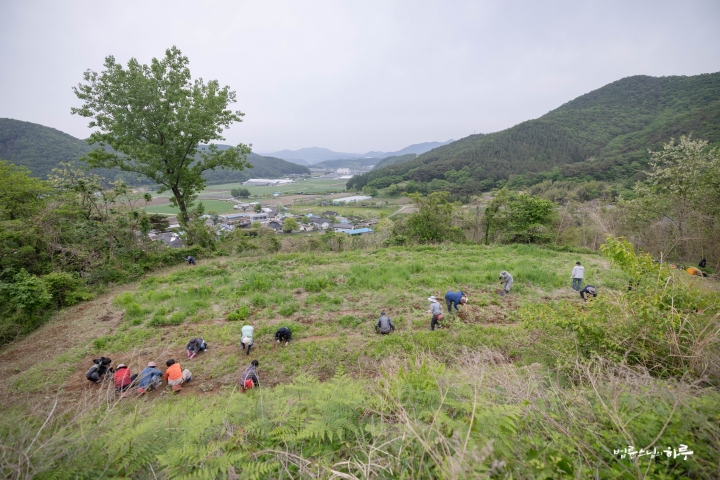
There were so many balloon flowers that the Dharma teachers made a new suggestion.
“Sunim, there are so many balloon flowers in this row that it would be good to keep it as a balloon flower bed. We’ll pull out all the weeds.”
“That sounds good. Let’s do that.”
Due to the abundance of balloon flowers, they decided to preserve one row as a balloon flower bed. All the volunteers worked together to pull out everything except the balloon flowers.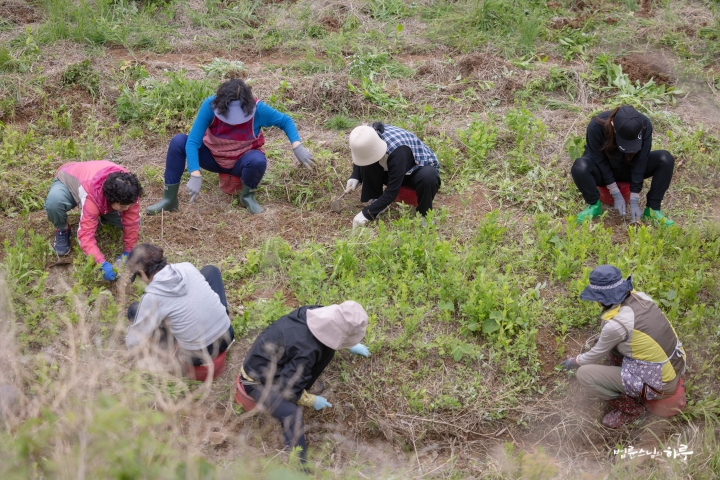
The weed-covered field was quickly transformed into a balloon flower bed.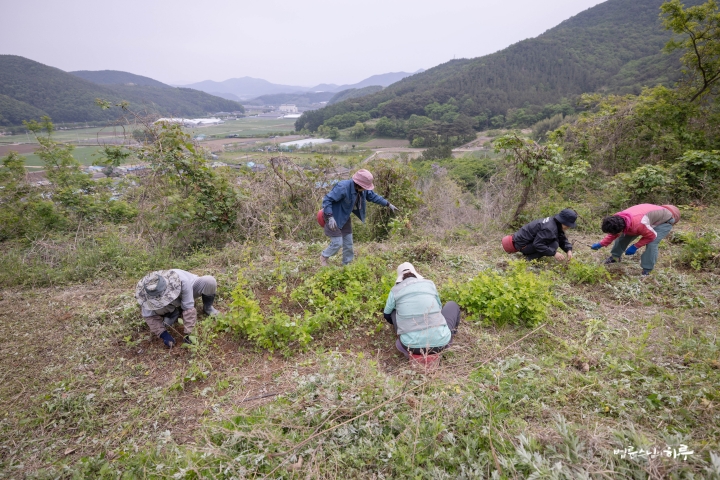
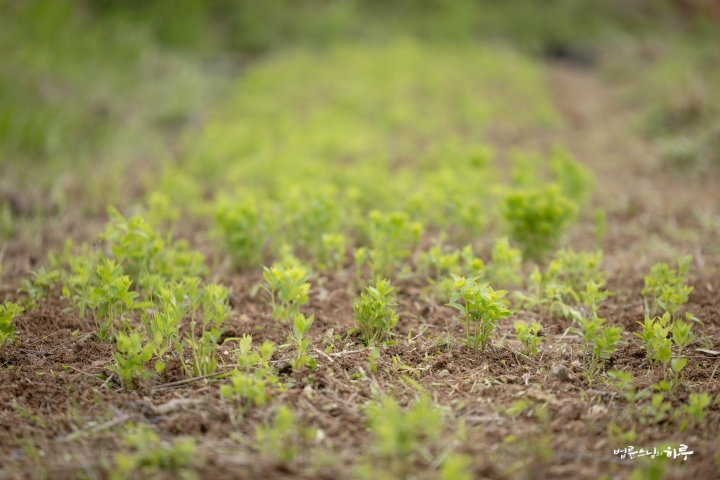
The harvesting of the balloon flowers became more lively. Exclamations of delight erupted whenever someone dug up a particularly thick root. While everyone was happily harvesting, a tractor arrived at the field.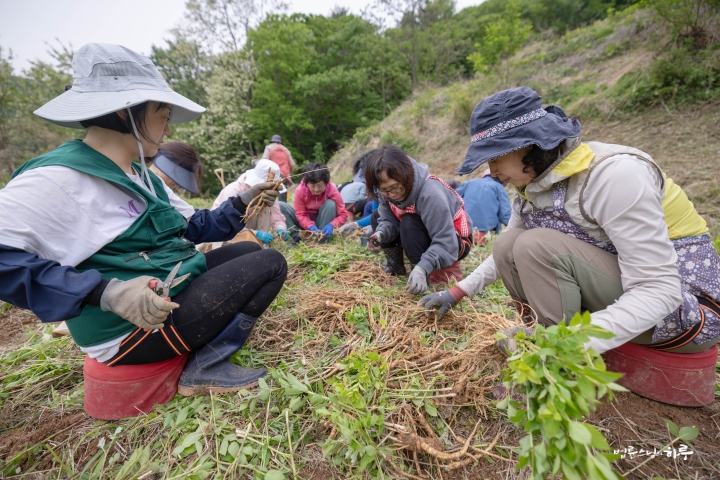
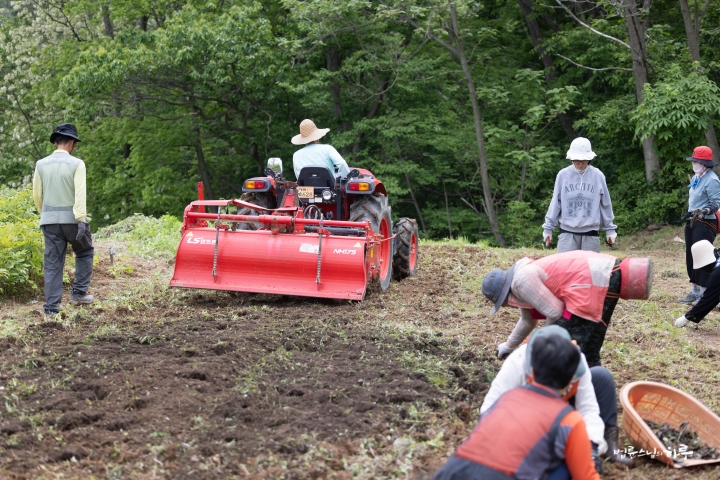
Under Dharma Teacher Myodang’s direction, they divided the space for new fields, and the tractor began plowing. The tractor first went up to the upper terrace. As it plowed, the reddish-brown soil was turned over, releasing a rich earthy aroma. Volunteers followed behind the tractor, spreading compost. The upper terrace was neatly transformed into a new field.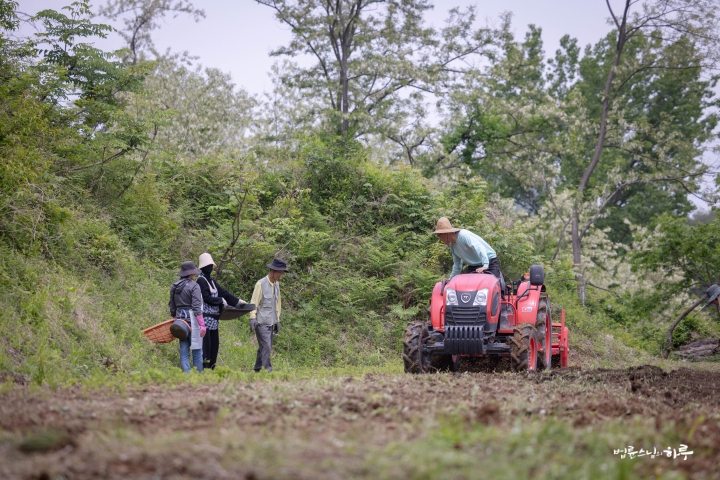
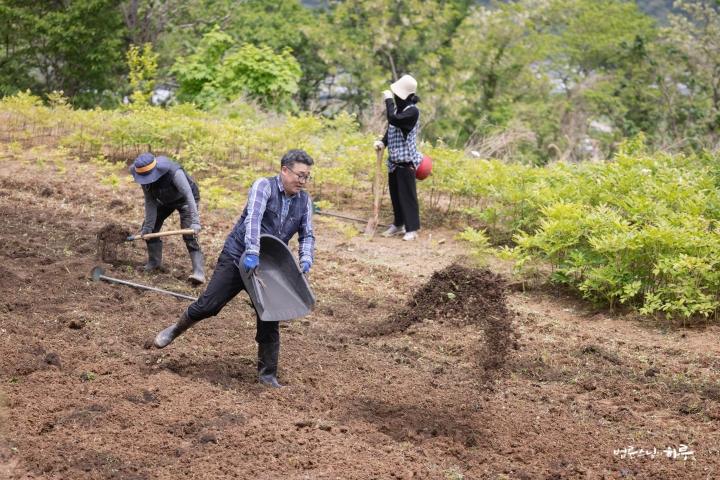
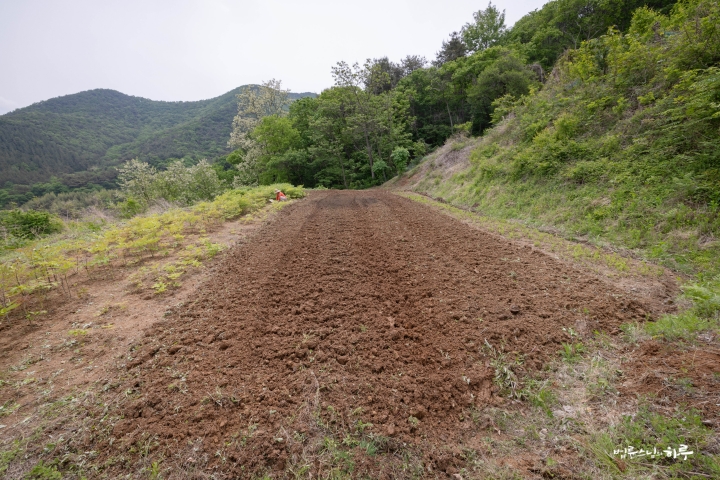
Next, the tractor moved down to the lower terrace. Again, as the tractor plowed, the green weeds disappeared, revealing moist soil, and the field began to breathe again.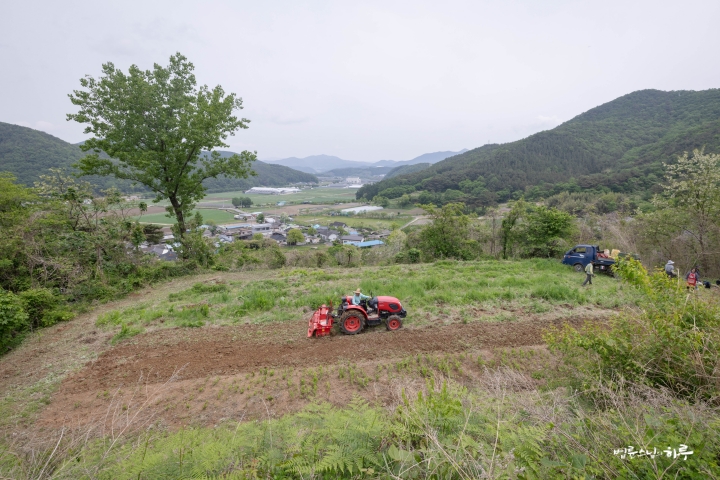
“Alright, we’ll conclude our volunteer work now. Let’s go to the Dubuk Retreat Center for our closing meeting.”
After watching the soil being plowed, Sunim and the volunteers went down the mountain.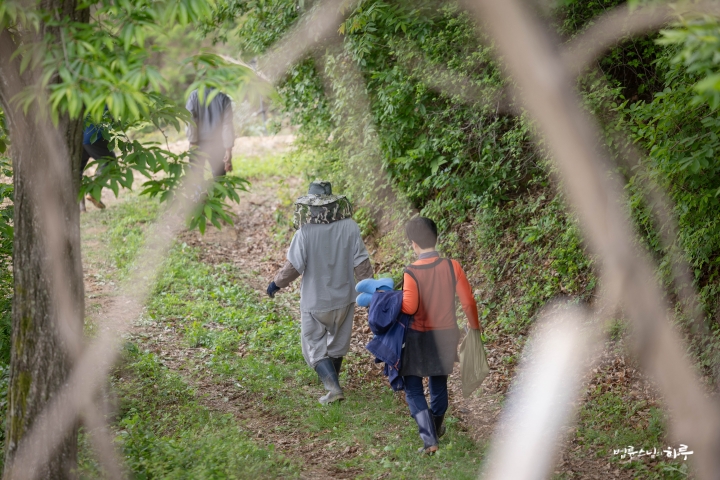
At 11:30 AM, they arrived at the Dubuk Retreat Center and began the closing meeting to wrap up the day’s farming volunteer work. The Sangha requested Sunim to share some words with three bows.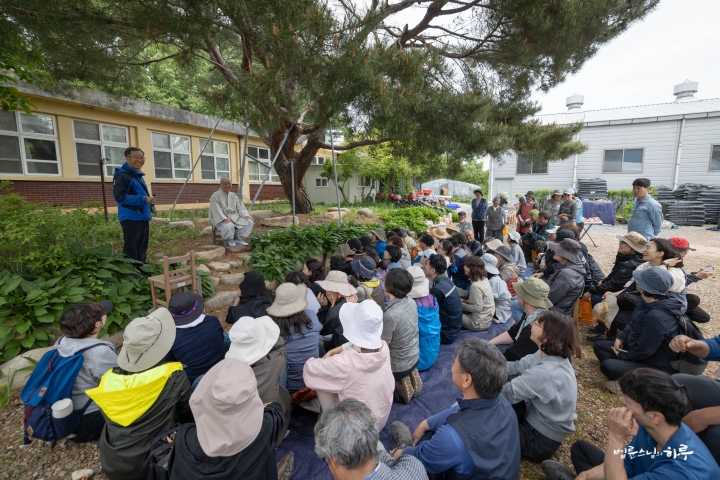
“Due to the 100-Day Dharma Talk period, I haven’t been able to help much with the farming, and there have been issues with the farming team, so the farm management hasn’t been going well. That’s why I made this special urgent request to all of you. Yesterday, about 100 people came to volunteer, and today, about 60 people came. Thank you all for coming despite your busy schedules. Did you enjoy working together?”
“Yes.”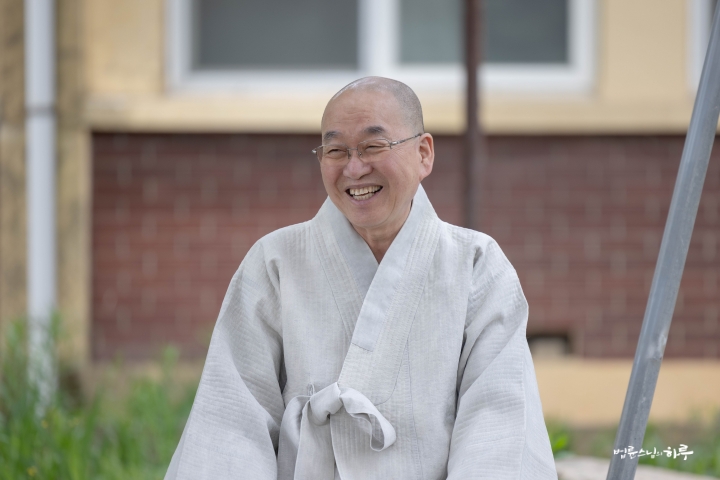
“The view from the upper field is beautiful. Please consider volunteering when we occasionally request help.”
Besides the upper field, volunteers worked in various areas including the greenhouse, the roadside field, building pepper drying racks, and maintaining the school surroundings. Sunim expressed his gratitude to everyone who had worked hard.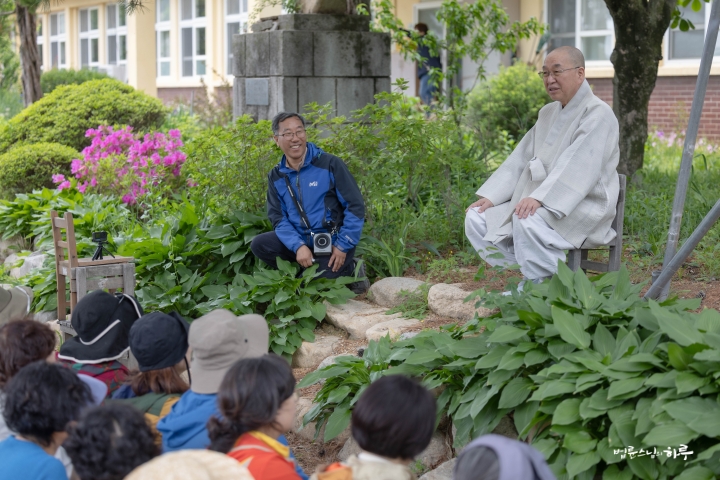
After taking a group photo under the pine trees, everyone had lunch.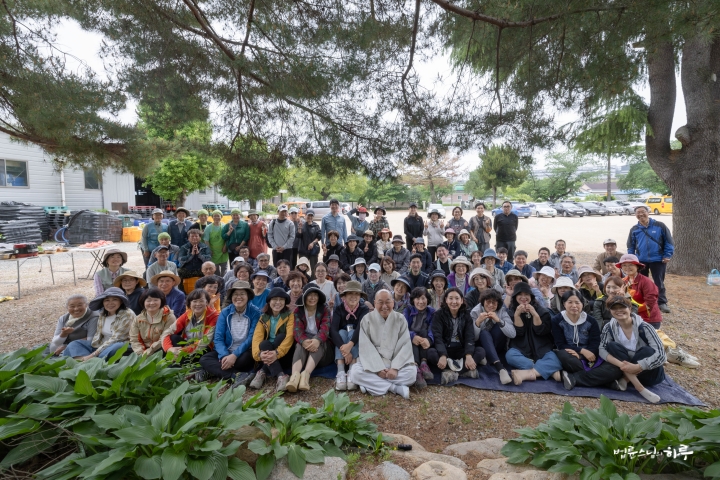
Noodles were prepared for lunch today. Everyone sat down with a bowl of noodles and a few slices of watermelon.
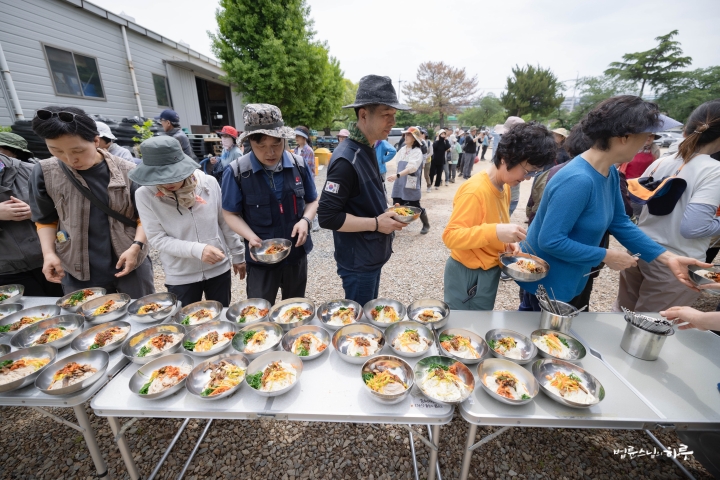
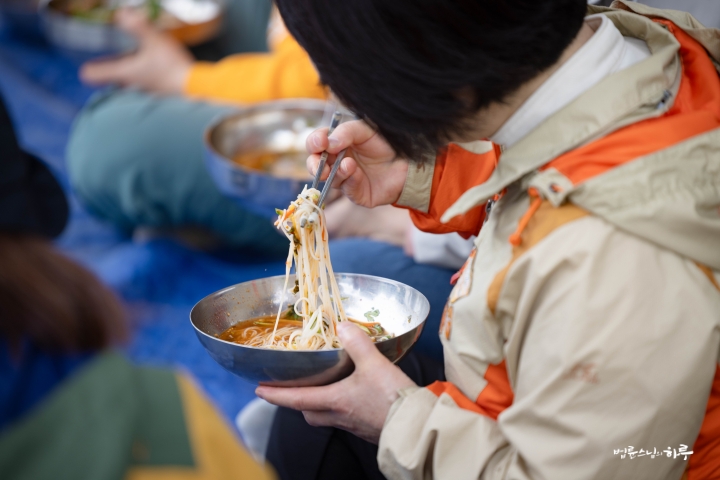
After all the volunteers returned home, Sunim headed to the vegetable garden. In the afternoon, he harvested vegetables to take back to Seoul.
After filling one box with vegetables, Sunim planted new seeds to experiment with growing cultivated ginseng.
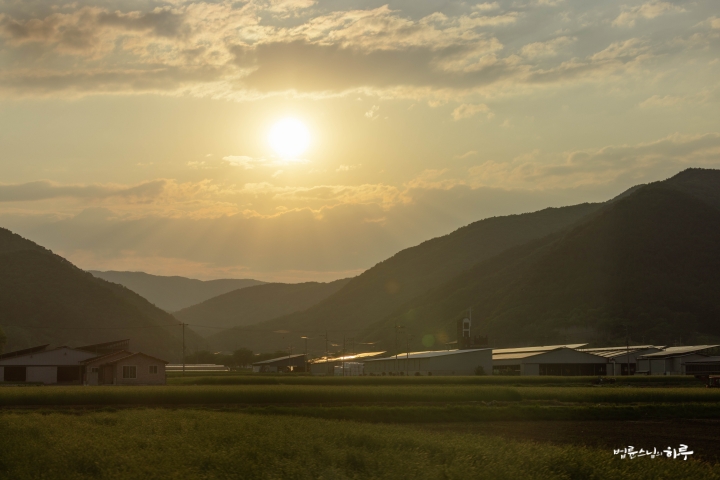
Upon finishing the garden work, Dharma Teacher Hwagwang mentioned he had something to discuss, so they met and had a conversation. Dharma Teacher Hwagwang began by sharing his concerns.
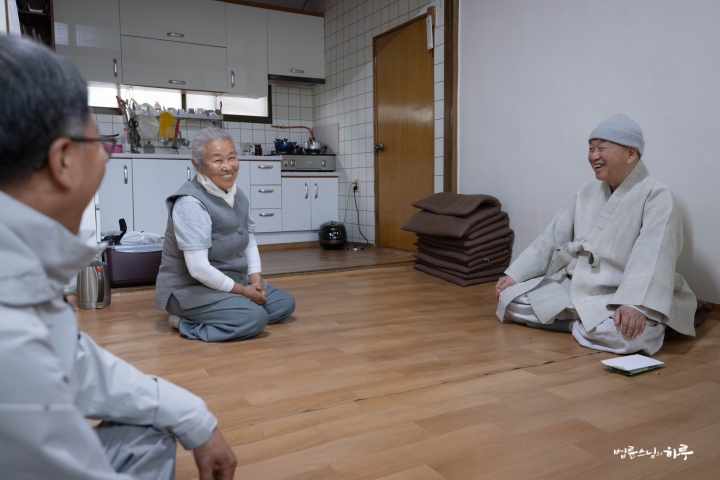
“I’m getting older and my strength is diminishing. As my body keeps ailing, I’d like to step back a bit from the Dubuk Retreat Center.”
Sunim smiled and replied:
“I recently met my lay sister who is over eighty years old and still doing all her farm work with a hunched back. You’re still in your prime working years, Dharma Teacher Hwagwang. (laughs)
If you find the field too large to manage, we could try planting some cultivated ginseng. We can experiment with it first, and if it proves easy to manage, we can expand. Whenever fallow land becomes available, we can continue planting cultivated ginseng as part of our environmental efforts. I’ve heard it doesn’t require any fertilizer. Let’s experiment to see if that’s true and find a solution.”
Dharma Teacher Hwagwang offered Sunim the money he had saved over the past year from farming.
“Thank you.”
After taking a commemorative photo together and encouraging Dharma Teacher Hwagwang, Sunim left the Dubuk Retreat Center.
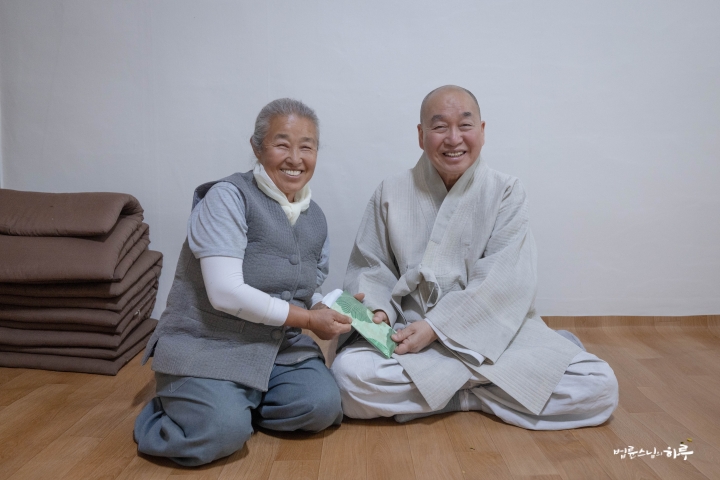
At 6:30 PM, Sunim departed from the Dubuk Retreat Center and headed to Seoul.
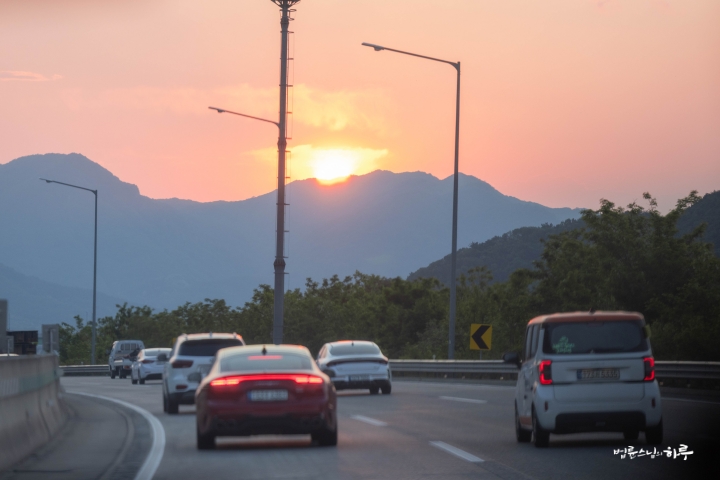
After a four-hour drive on the highway, Sunim arrived at the Seoul Jungto Center at 10:30 PM, concluding his day.

Since there was no Dharma talk today, we would like to share a conversation between Sunim and a questioner from the Youth Talk held four days ago.
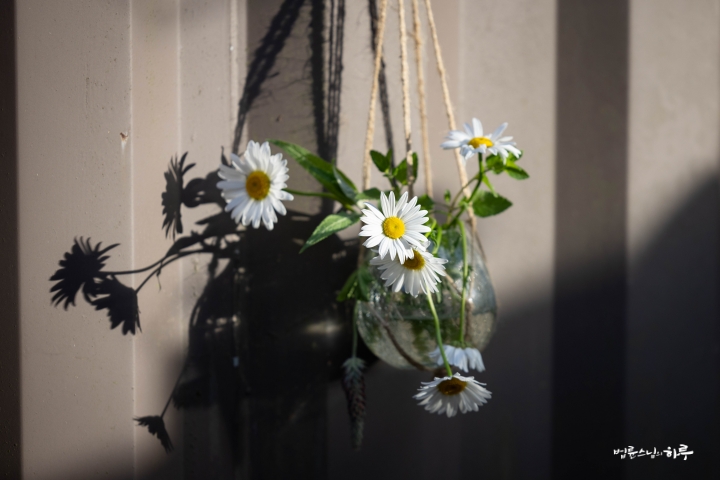
How Can I Avoid Making Judgments?
“There is no way not to discriminate. Making discriminations is part of being human. I also make discriminations.”
“Is that all?”
“Yes, that’s my complete answer. Let me give you an example with tea. When I want warm tea, I discriminate by thinking ‘the tea is too cold.’ When I want cool tea, I discriminate by thinking ‘the tea is too hot.’ If I want a large cup, I discriminate by thinking ‘this cup is too small.’ If I want a small cup, I discriminate by thinking ‘this cup is too large.’ We all make discriminations like this. But what’s the problem with that?
The problem arises when I want a large cup but am given a small one, and I suffer because of it. In this case, I can either use the small cup I’ve been given or ask for it to be changed. If they won’t change it, I can simply use the small cup, or if I really dislike it, I can bring my own. There’s no reason to suffer.
Why does suffering arise? It comes from clinging to the idea that everything should go my way without me doing anything. For example, if you think the constitution should be amended but you don’t take any action and just complain, you’ll suffer. If you want change, you must act, and if that doesn’t work, you must accept reality. If you’re cold, put on more clothes; if you’re still cold, make a fire. If you’re hot, take off some clothes; if you’re still hot, get in the water. Complaints like ‘Why is the weather so hot?’ or ‘The weather is too cold’ are pointless. No matter how much you complain, nothing changes. You should make choices based on the situation. The problem is discriminating between right and wrong and suffering because of it. Please ask again what you’re really curious about.”
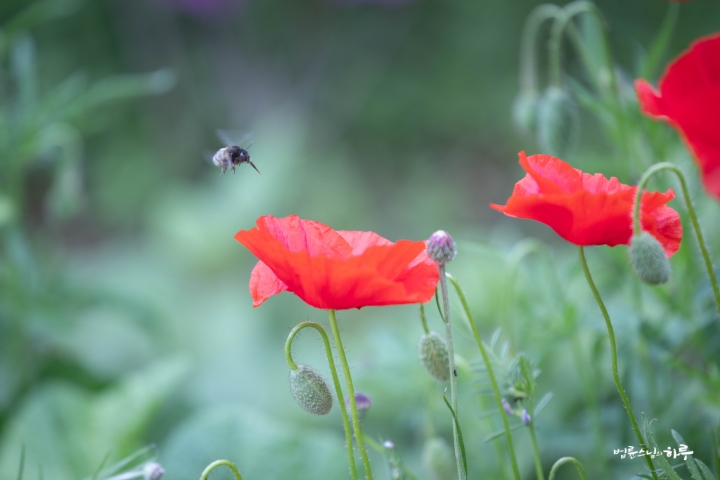
How Can I Avoid Being Hurt by Others’ Words?
“There is no such method. If you don’t like it, you can simply say, ‘I don’t like what you’re saying.'”
“But realistically, that’s not easy to do.”
“Then you’ll have to endure the stress, won’t you? But recognizing that it’s not the other person’s problem is what practice is about. It’s not the other person’s problem but rather an issue with your own karma that causes you to dislike something. Practice means not being captivated by feelings of dislike. As we live in this world, does everything happen the way we want? Most of the time, it doesn’t. But you’re either too greedy or too foolish to think that everything in this world can go your way. You complain based on the unrealistic premise that the world will fulfill all your desires, but reality is never ideal.
A politician once came to me complaining, ‘The opposing side criticizes and insults me.’ I replied, ‘Then don’t be a politician!’ He protested, ‘But we should engage in fair competition.’ Of course, fair competition would be nice, but reality isn’t like that. In the past, people would simply kill their competitors with swords. At least nowadays, they kill with words rather than swords. We should consider that an improvement. This perspective acknowledges reality as it is. I’m not saying to accept everything uncritically, but rather to make better choices based on the reality we face.
Another questioner complained that colleagues were speaking ill of them behind their back. I responded, ‘Isn’t it better that they talk behind your back rather than to your face?’ If someone here stood up and said, ‘How could you do this, Venerable Pomnyun Sunim?’ would that be better? Or would it be better if they criticized me after I left? Speaking behind someone’s back can actually be a form of consideration. Of course, it would be better if they didn’t criticize at all, but since we live in a world with diverse people, such things are inevitable. In fact, through education and training, we’ve developed the courtesy to speak behind someone’s back rather than directly to their face. You have so many complaints because you view the world too idealistically.”
“Then is there a way to live without suffering?”
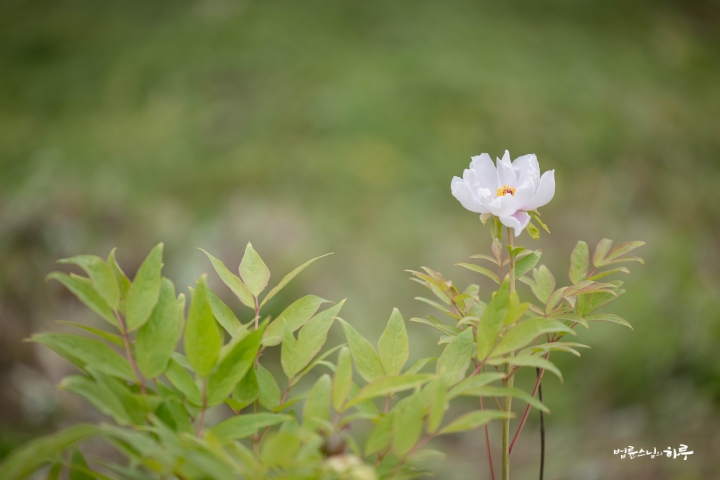
“It’s not that there’s a method to avoid suffering; you simply don’t suffer. Asking ‘Is there a way not to suffer?’ shows an irresponsible attitude toward life. If you want to suffer, then suffer. If you want to be free from suffering, then don’t suffer. This is because there’s actually nothing in the world that inherently causes suffering.
Think about it. What specifically causes suffering? Is divorce something to suffer over? Before marriage, you lived well on your own. After living together and separating, you’ve simply returned to your original state. If you weren’t suffering when you were alone before, why suffer now?
In reality, there’s no problem at all. Were you born with money? You lived well as a child without money. Then as an adult, you earned some money, and now it’s gone. You’ve just returned to your original state—what’s the problem? There’s actually no problem. You create problems for yourself and suffer. But because you keep being greedy and thinking, ‘I wish I could be like that person,’ making comparisons, suffering arises.
I’m not telling you not to suffer. If you want to live in suffering, go ahead. If you want to touch a woman’s leg, do it. But you’ll be caught for sexual harassment and spend about three years in prison. If you don’t want to go to prison, then don’t touch, even if you want to. Then you ask, ‘How can I not touch when I want to?’ If someone asks this twice, I tell them, ‘Then touch and go to prison!’ If they ask if there’s a way to touch without going to prison, that’s greed. I tell them there’s no such way. But some religions teach that there is, so you pay money and pray. If you don’t want to study, don’t go to college. If you want to go to college, you have to study even if you don’t want to. But you ask if there’s a way to go to college without studying. I simply answer that there’s no such way. If you still ask, ‘Is there possibly a way?’ I tell you to go ask someone who teaches that such a way exists. Do you have any more questions?”
“I understand now. Thank you.”
Tomorrow is the 85th day of the 100-Day Dharma Talk. In the morning, Sunim will give the 5th lecture on the Heart Sutra at the Dharma Hall on the 3rd floor of the Jungto Social and Cultural Center, and in the evening, he will give the 18th lecture of the Buddhist Social Studies Course in the main auditorium in the basement.





